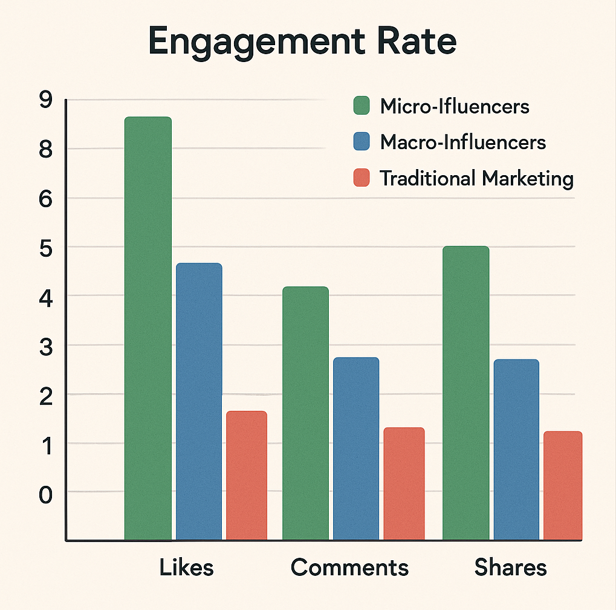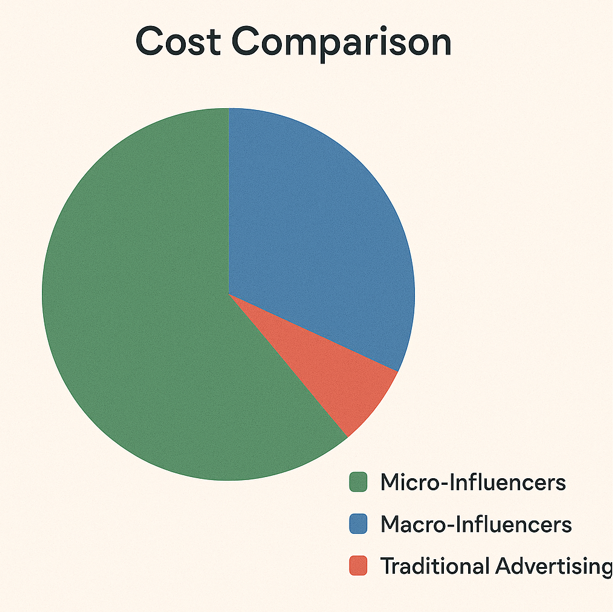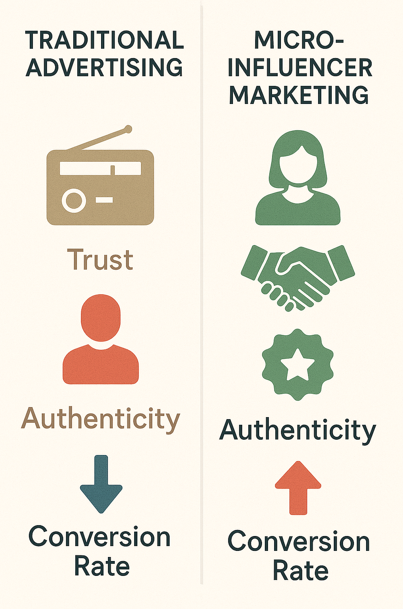Micro-influencers are social media users with a smaller but highly engaged following, typically between 1,000 and 100,000 followers. They have carved a niche for themselves by offering authenticity and relatability to their followers, which makes them more trustworthy than traditional influencers.
For businesses, partnering with micro-influencers can be a game-changer. They tend to have higher engagement rates and their followers are more likely to trust their recommendations, which can translate into higher conversion rates.
Micro-influencers may be small in follower count, but they pack a mighty punch in the world of marketing. In an age where consumers are increasingly skeptical of flashy celebrity endorsements and sponsored posts, these digital tastemakers are emerging as the go-to choice for brands that want to reach a highly engaged, targeted audience. Think of micro-influencers as the digital equivalent of word-of-mouth advertising, with their genuine, relatable content earning them credibility and trust among their followers.
With these three key benefits in mind, it’s no wonder why micro-influencer marketing is quickly becoming the go-to strategy for brands looking to connect with their target audience in an authentic and meaningful way.
Better Engagement
When it comes to social media marketing, engagement is king. Micro-influencers are a goldmine for engagement, boasting higher rates of likes, comments, shares, and even clicks than macro-influencers. Their smaller, niche audiences are more likely to relate to the influencer’s content, creating a sense of connection and community. This deep connection results in followers being more likely to take the influencer’s recommendations seriously, boosting engagement and conversions for businesses.
This heightened level of engagement is not just limited to micro-influencers’ personal profiles either. Brands who partner with micro-influencers often see a surge in engagement on their own social media platforms. This ripple effect of engagement can lead to increased brand awareness, customer loyalty, and sales, all thanks to the power of a few well-placed influencer endorsements. So, if you are a brand looking to boost your social media presence and reach a highly engaged audience, micro-influencers are a must-have in your marketing toolkit.

Cost-Effective
The great thing about micro-influencers is that you do not have to break the bank to work with them. They tend to charge less for collaborations, making them a cost-efficient option for businesses on a budget. For instance, a micro-influencer with 20,000 followers might charge approximately 1% of what a celebrity influencer with millions of followers could demand for the same type of post. This means that, for a much lower cost, brands can benefit from increased engagement and authenticity that micro-influencer collaborations bring.
This affordability gives micro-influencers an edge in the marketing world, particularly for small businesses that may not have the funds to afford traditional advertising campaigns.
Another benefit of micro-influencer marketing is its flexibility. With lower collaboration costs, you can experiment with different types of content and try out various influencers to find the perfect fit for your brand. This flexibility can lead to more creative and authentic partnerships, which can generate more meaningful results in the long run.
Additionally, working with micro-influencers allows you to tap into their specific niche audience, which could be a goldmine for your business if it aligns with your target demographic.

Increased Trust and Authenticity
Consumers are smart, and they can smell a sponsored post a mile away. In an age of skepticism and ad blindness, micro-influencers stand out for their genuine, down-to-earth content. Their smaller followings mean they tend to interact with their audience on a more personal level, fostering a sense of trust and authenticity. This leads to followers valuing their recommendations more than those from macro-influencers who may be perceived as ‘selling out’. This increased trust can result in higher conversion rates for brands.
The power of micro-influencers lies in their relatability and niche interests. When a micro-influencer talks about a brand or product they genuinely like, their followers are more likely to see it as a trustworthy recommendation from a friend, rather than a sales pitch. This perceived trust can help brands overcome the stigma of traditional advertising, fostering a sense of authenticity and connection with their target audience.
In essence, micro-influencer marketing is a long-term investment in credibility and brand loyalty.

The rise of micro-influencer marketing signals a shift in consumer behavior and advertising strategies. In an increasingly crowded digital landscape, micro-influencers offer a refreshing and effective alternative to traditional advertising methods. Their genuine engagement, niche interests, and relatable content make them a valuable asset for brands looking to build trust, authenticity, and conversion rates.
While the world of marketing is ever-evolving, one thing remains certain: micro-influencers are here to stay. As brands continue to embrace this powerful tool, they will reap the benefits of a more personal, authentic, and cost-effective form of marketing.
In the grand scheme of things, micro-influencer marketing represents a return to the roots of advertising: word-of-mouth. In a world where consumers are bombarded with flashy ads and dubious endorsements, the power of authentic recommendation is once again taking center stage.
Micro-influencer marketing offers a cost-effective, relatable, and trustworthy approach to brand building, with the potential for greater engagement, brand loyalty, and conversion rates.



